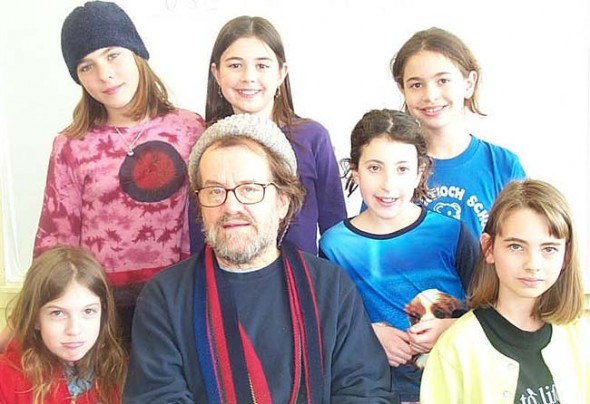
Don Wallis, center,was a lifelong education advocate and died before a film on alternative education he purchased, August to June: Bringing Life Back to School!, could be publicly screened. It will be shown at the Little Art Theatre at 4 p.m. on Oct. 14. From left to right clockwise around Wallis are Mary Triplett, Jade Turner, Tasha Fox, Liana Rothman, Hana Katz-Stein and Emily Corwin Renner, circa 2002. (Submitted photo courtesy of the Antioch School)
Education film to honor Wallis
- Published: October 11, 2012
For 90 years the Antioch School has been an alternative educational option for local children. But what if the Yellow Springs public schools could become more like the Antioch School?
How could a public school embrace the ideas of child-centered learning, progressive education and open classrooms? And is it even possible with the increasingly mandated testing and curriculum standards? A film coming to the Little Art Theatre on Oct. 14 at 4 p.m. seeks to answer those questions.
Hosted by the Antioch School in memory of board member and lifelong local education advocate Don Wallis, the film, August to June: Bringing Life to School!, follows the third-fourth grade class of teacher Amy Valens for one year in a northern California public school that uses an open classroom model.
“The biggest thing that people come away with from the film is the sense that every child is coming in with different needs and different abilities and takes something different from school,” said Valens, who will speak following the film screening. “When you’re in an environment where there is flexibility, where [students] can be respected for the style and speed that they learn, magical things happen.”
Wallis, who was passionate about child-directed learning and taught creative writing at the Antioch School for decades, had purchased the film and circulated it amongst Antioch School teachers before he died in January. Donations will be accepted at the screening for the Antioch School’s Don Wallis scholarship fund.
“Aside from our school, we want an excellent education for all students in Yellow Springs,” said Antioch School kindergarten teacher Lindie Keaton this week. “Don’s passion was not just for Antioch School students, but for all the youth in the village.”
Valens, now retired, returns to the community in which she learned her educational philosophy. Valens graduated from Antioch College in 1968 with a degree in education, and was a student-teacher at the Antioch School and at Yellow Springs High School, formative experiences that shaped her educational approach.
“Most of my ideas about education came out of the education classes at Antioch,” Valens said. “The atmosphere at Antioch, the independent study, the democratic process — that complete experience told me that learning by doing and being engaged in your learning is very important.”
According to Valens and several Antioch School teachers, testing can be the biggest hindrance to a child-centered education because it pushes children to learn at a pace that may not be appropriate for their brain development. That’s because state tests drive the curriculum, and sometimes students are pushed to learn things they’re not ready for.
“The earlier you start with curricular programs not developmentally appropriate, the earlier you set up the child to be a failure,”Antioch School older group teacher Chris Powell said. At Valens’ former school, Lagunitas open classroom elementary school in Marin County, Calif., about 90 percent of students opt out of No Child Left Behind testing (35 percent opt out district wide). Those students that do take the tests receive no in-class instruction on its content. The Lagunitas district has actually sent money it received back to the state to help the school improve its test scores.
An alternate model to education, by contrast, would encourage problem-solving, self-motivation and cultivate a love of learning, Antioch School teachers said.
“A curriculum should reflect the students and their interests,” Valens said of the open classroom model, an amalgam of progressive ideas originally conceived by John Dewey. The student-centered model became popular in the 1970s. “Competition is not helpful, so we create a non-competitive situation without grades,” she said. “And learning is going to be experiential since students learn best when they experience their environment.”
While it may not be possible for public schools to be completely progressive, public schools can incorporate elements of discovery and project-based learning, Antioch School teachers said. Valens agrees that incremental steps can be taken to improve education, though it can be more difficult.
“This film is talking about respecting children,” Valens said. “That can happen with a teacher in the front of the room and students in chairs, but it’s harder because you create the dichotomy that teachers know everything.”
Above all, Valens emphasized that students should not be treated like “receptacles” for one body of knowledge, which is the trend in education in American today. And she said that she believes judging a school’s success based solely on the results of standardized tests limits education and may have enormous ramifications for society as they create students who expect one right answer for every problem.
Wallis, who died unexpectedly at age 69, had hoped the film would spark dialogue locally about education. Wallis had long been interested in alternative philosophies of education, according to his daughter Sarah Wallis, and had even started an alternative school in Indiana. He worked with students at both the Antioch School and the town’s public schools and continued to serve on the Antioch School board after he left all others. Antioch School teachers said he was very supportive of them in their work and wanted to make sure the Antioch School model thrived.
“The children and youth are what forms the basis and future of the community, so he wanted to support their development and voice as much as possible,” Sarah said.
The Yellow Springs News encourages respectful discussion of this article.
You must login to post a comment.
Don't have a login? Register for a free YSNews.com account.










No comments yet for this article.